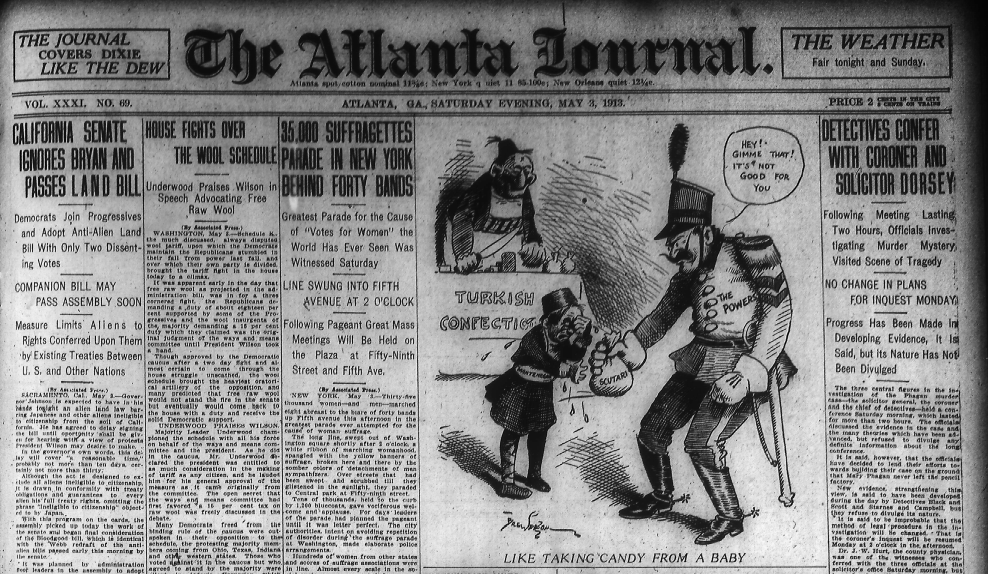Detectives Confer With Coroner and Solicitor Dorsey
Atlanta Journal
Saturday, May 3rd, 1913
Following Meeting Lasting Two Hours, Officials Investigating Murder Mystery Visited Scene of Tragedy
NO CHANGE IN PLANS FOR INQUEST MONDAY
Progress Has Been Made In Developing Evidence, It Is Said, but its Nature Has Not Been Divulged
The three central figures in the investigation of the Phagan murder case—the solicitor general, the coroner and the chief of detectives—held a conference Saturday morning, which lasted for more than two hours. The officials discussed the evidence in the case and the many theories which have been advanced, but refused to divulge any definite information about the long conference.
It is said, however, that the officials have decided to lend their efforts towards building their case on the ground that Mary Phagan never left the pencil factory.
New evidence, strengthening this view, is said to have been developed during the day by Detectives Black and Scott and Starnes and Campbell, but they refuse to divulge its nature.
It is said to be improbable that the method of legal procedure in the investigation will be changed. That is the coroner’s inquest will be resumed Monday at 2 o’clock in the afternoon.
Dr. J. W. Hurt, the county physician, was one of the witnesses who conferred with the three officials at the solicitor’s office Saturday morning, but he refused to discuss the case. Dr. Hurt made the examination of the dead girl’s body.
M. B. Darley, general foreman of the National Pencil factory, and two young women employees were among the several witnesses examined by the officials during the conference. It is said that none of them disclosed events of importance.
VISIT SCENE OF TRAGEDY.
Following the conference, Solicitor Hugh Dorsey, his assistant, E. A. Stephens; the coroner, the chief of detectives and Detectives Black and Scott met at the factory, which had then closed for the day, and went over the scene of the tragedy. It was stated that the inspection trip was made simply in order that the solicitor general might be made familiar with the building, the different distances, and other physical points in the case.
RUMORS DENIED.
Chief of Police J. L. Beavers and Chief of Detectives Newport A. Lanford both positively denied Saturday morning that there has been a confession from either of the men held in the Tower in connection with the Phagan murder mystery.
They characterized the rumors of a confession, which have spread over the entire city, as idle gossip, which they say does a great injustice not only to Leo M. Frank, the superintendent of the factory, and Newt Lee, the night watchman, but to the men working on the case as well.
The two police officials, who have been constantly in touch with every movement in the case, declare that both Mr. Frank and the negro have not changed their statements that they know nothing about the crime in connection with which they are held.
Both officers deplore the wide circulation of the report of a confession and many other similar rumors, which, they say, are founded on no fact.
The elimination from the Phagan murder case of countless wild rumors and baseless reports has been occupying the time of the squad of detectives assigned to solve the Phagan mystery, by Chief Lanford.
NEVER LEFT FACTORY.
The detectives have been successful up to the present in showing that every report that Mary Phagan was seen after noon of last Saturday was without foundation. If the girl did leave the National Pencil factory in the basement of which her lifeless body was found at 4 o’clock Sunday morning by Newt Lee, the negro watchman, the detectives want to know it, for if this fact could be established what they term their “main lead” would be broken.
If Mary Phagan did not leave the factory after noon Saturday then the detectives have only to prove what transpired in the stone building and they will have solved the mystery.
CASE IS STRENGTHENED.
As the result of the elimination of so many conflicting reports the officers say that their main case has been strengthened; and Saturday morning, as the men started out for a day of hard work, they had an air of renewed confidence in their ability to solve the murder mystery within a short time.
All of the rumors had to be investigated, and now that most of them have been proved without foundation, the detectives consider that the case is less complicated than it was two or three days ago.
Several of the officers have been conducting a general investigation of the factory with particular reference to the treatment of the women employed by the officials and by the men who work there. While past occurrences there would probably be inadmissible in the trial of an individual for the murder of Mary Phagan, still the knowledge of past events might give the detectives a new clue or “lead,” they say.

